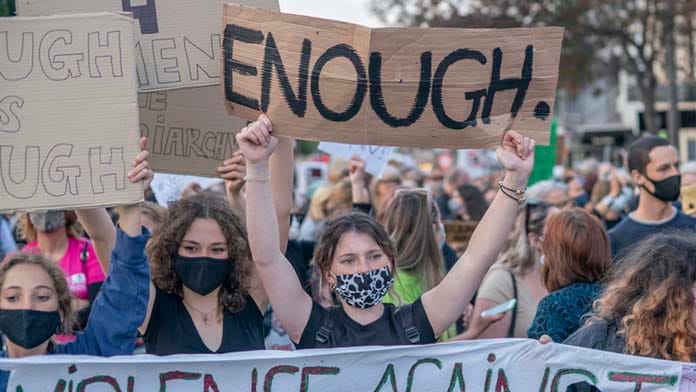Critics argue the government response to violence against women is failing, writes Lucy Honan, but recognising its roots in capitalism and the family is necessary to addressing it
The Labor government’s 2022-2032 plan to end gender based violence “in a generation” is the height of public policy gaslighting.
It is seven years since the global rage against the extent of violence against women bubbled up into the #MeToo moment. But rates of sexual violence in Australia are increasing, as are the misogynistic attitudes of young men. Domestic and family violence remains extremely prevalent.
Efforts to change men’s behaviour through school lessons, advertising campaigns, men’s behaviour change programs, and coercive control laws have failed spectacularly, and in many instances created more danger for women. As a result, the DFSV (domestic, family and sexual violence) sector is now beset by crisis and division.
This year, the government appointed expert panel’s report “Unlocking the Prevention Potential” controversially broke from what they called the predominating “gender equality model” which focuses almost all efforts to reduce violence on challenging cultures of disrespect for women.
Their recommendations marked a modest, but welcome shift away from targeting men’s behaviour, toward greater government accountability, including mechanisms to increase women’s economic independence, housing and other support for men who use violence, and independent oversight of police responses to gender based violence.
Labor met the report with more fanfare; a declaration of a “national crisis” of violence against women, and a slew of funding announcements. But the sound and fury concealed what some organisations estimate to be a 12.5 per cent annual cut to Commonwealth funding for frontline services when inflation is considered.
We need a serious plan to end gender based violence. We have to reckon with the violent class power that organises and benefits from the oppression of women through the nuclear family. And we need to start with a more radical understanding of how deep the problem is.
The nuclear family and capitalism
The nuclear family is perhaps the most important tool for making capitalism’s theft of workers invisible.
For working class people, the family is a buffer from naked market exploitation; it gives people social roles and relationships that are not under the direct control of bosses, and it is invested with obligations that run counter to those of capitalist competition, like unconditional love, mutual support, and protection of the vulnerable and economically unproductive.
But rather than posing a threat to capitalists, families give workers a reason to go to work, and a way to pool resources to have children, something that benefits the system through replacing the working class.
Women’s contradictory social role in the nuclear family leads to her oppression. As primary carer for children, at least partial economic provider, and provider of sexual satisfaction and emotional protection for her partner against the abuses and degradations of capitalism, she is permanently in service to other people, and is lauded for her capacity to “do it all”—if she can.
But most of this work has no exchange value on the labour market. The unpaid work women do to maintain the internal functioning of the family devalues women’s labour both paid and unpaid.
The less involved men are in the labour within the family, because they are working outside it as primary economic providers, the more their labour is worth in comparison to women—despite ultimately still being exploited themselves at work.
This toxic dynamic drives partners to try to claw back from each other the value that the ruling class drains from them both.
All members of the family, including children, are ensnared in the bitter contradiction between the idealised hopes and obligations of their roles within the family and their incapacity to fulfil them.
The more pressure the family is under, because of racism, unemployment or low wages, isolation, illness, or very young children, the more its members need each other, but the fewer resources it has to draw on.
The nuclear family doesn’t explode outward in strikes or other forms of resistance, it implodes.
Ruling class domination normalises abuse. The chasm of inequality at the heart of the family creates an opportunity for men to replicate the pattern, and abuse women to try to restore their own depleted status.
Women often fight back against this abuse, to defend themselves and their children. Sometimes this leads to police misidentifying them as the abuser.
Too often women’s economic dependence means they are unable to leave a violent partner, and the abuse can escalate.
Areas of low income and high unemployment correlate with the highest levels of domestic violence. Racism, disability, pregnancy and isolation increase the incidence of family violence.
Violence against women often plays out in private, but the conditions for it are created by a system wide dynamic, not an interpersonal one.
You can’t ‘change the story’ without changing reality
Two of the government’s expert panelists, Jess Hill and Michael Salter, have also been vocal critics of the government’s “Change the Story” advertising campaigns and Respectful Relationships school programs, for having not made a dent in rates of violence, or even in changing men’s attitudes.
Despite “Stop it at the Start” government advertising since 2015, and Respectful Relationships lessons in some form in every government school, a 2024 study found that 22 per cent of the 18 to 30-year-old men surveyed agreed or strongly agreed that “men should use violence to get respect if necessary”; a 2 per cent increase from 2018.
One survey of high school boys in NSW found that a third consider Andrew Tate (a proudly violent and misogynistic social media influencer) “relatable”, and one quarter “look up to Andrew Tate”.
But the alternatives the expert panel proposed are mired in the same mistaken theory that sexist attitudes can be shifted without challenging the entire structure of the nuclear family. They promote a greater focus on representations of “positive masculinities”, targeted men’s behaviour change programs, and programs to combat online misogyny and “radicalisation”.
There can be no positive masculinity under capitalism. It is inherently exclusive of women, and of higher status.
Working class people of all genders can oppose all manifestations of sexism and build the struggle against the class interests that enforce gender roles. But none of us can opt out of these dynamics; they are endemic to capitalism.
Tate and his brand of online misogyny is repulsive, but it is an outgrowth of mainstream gender role expectations, not an aberration. When Tate says “men and women have different roles and responsibilities” and “a man has a duty to protect and provide for her wife” and lauds women’s value as their capacity to produce and rear children, he is describing the gendered division of labour under capitalism.
This division is certainly not natural or inevitable, but it is a material reality. The women in working class young men’s lives are doing copious unpaid and underpaid caring work.
The chauvinism Tate figures preach has a purchase for some because boys can test and expose a “truth” about the way social power is organised. For example, female teachers’ and students’ status is confirmed as “replaceable” (which is a Tate term for a low status person), when sexist bullying at school can predictably prompt school management to blame victimised female teachers for poor classroom management.
The response is not just a sexist attitude that principals can be re-educated about. It reveals (to the humiliation of the teachers) the reality of women workers’ lack of power in the workplace.
Whose coercive control?
A strength of the “Unlocking the Prevention Potential” report is the authors’ recognition of the way police too frequently “misidentify” victims of domestic violence as perpetrators, and their failure to respond to and take seriously victim-survivor calls for assistance.
But one of their key recommendations, for domestic violence threat assessment centres, would extend the state’s ultimate coercive powers further.
One of the ways that police powers are being extended in the name of protecting women from domestic violence are new laws against “coercive control” being introduced in many states and territories.
Coercive control is a non-physical form of abuse defined by a NSW government fact sheet as, “any behaviour which scares, hurts, isolates, humiliates, harasses, monitors, takes away another person’s freedom or unreasonably controls their day-to-day activities.”
This description could easily apply to the normal way a boss behaves toward their workers, the way that schools control young people, how Border Force treats migrants and refugees, or the way police behave in general.
Police powers ultimately increase the pressures the family is put under. As Indigenous abolitionist and victim-survivor Tabitha Lean writes of her own experience, “real safety, especially for those of us most vulnerable to both interpersonal and state violence, cannot come from the same institutions that criminalise, surveil, and punish us.”
The Albanese government could immediately relieve the pressure on families that increases the prevalence of violence, and stops women from leaving violence. The expert panel proposed meagre improvements, like removing the Child Care Subsidy Activity Test.
Massive public housing builds, raising all Centrelink rates, an end to income management and permanent visas for all those on bridging visas would start to meet the scale of the DFSV crisis. But expert panels won’t win those reforms—let alone make them.
The family seems like our only refuge in a hostile world, but it’s a suffocating and dangerous trap. We need to build working class power, to fight for a society where solidarity, care and satisfying human needs can be the real goal and work of everyone—not just the unpaid, private labour of women.






